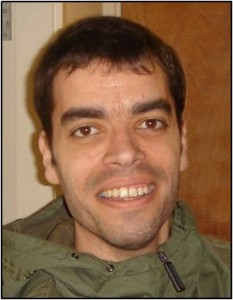 I obtained my degree in Chemistry in 1998 from the University of Santiago de Compostela (Spain), where I specialised in Organic Chemistry. At the same university I undertook postgraduate studies and obtained a PhD in 2004. Under the supervision of Prof Susana López Estévez, I developed the total synthesis of several marine natural polyacetylenes with important biological properties. After that, I moved to the field of polymer chemistry and I joined the group of Prof Neil Cameron at the University of Durham (UK) in 2005. As part of the EU training network ‘SmashyBio’, we worked on the development of highly porous materials for the reversible immobilisation of biomolecules. In 2006, I returned to the University of Santiago de Compostela to work with Profs Ricardo Riguera and Eduardo Fernandez-Megia, on the development on novel dendrimeric materials for applications at the chemistry-biology interface. Since october 2009, I have been working as a research fellow in the Division of Drug Delivery and Tissue Engineering, working on the development on novel polymeric materials for drug delivery and synthetic biology.
I obtained my degree in Chemistry in 1998 from the University of Santiago de Compostela (Spain), where I specialised in Organic Chemistry. At the same university I undertook postgraduate studies and obtained a PhD in 2004. Under the supervision of Prof Susana López Estévez, I developed the total synthesis of several marine natural polyacetylenes with important biological properties. After that, I moved to the field of polymer chemistry and I joined the group of Prof Neil Cameron at the University of Durham (UK) in 2005. As part of the EU training network ‘SmashyBio’, we worked on the development of highly porous materials for the reversible immobilisation of biomolecules. In 2006, I returned to the University of Santiago de Compostela to work with Profs Ricardo Riguera and Eduardo Fernandez-Megia, on the development on novel dendrimeric materials for applications at the chemistry-biology interface. Since october 2009, I have been working as a research fellow in the Division of Drug Delivery and Tissue Engineering, working on the development on novel polymeric materials for drug delivery and synthetic biology.
Web-Page: http://www.nottingham.ac.uk/pharmacy/people/francisco.fernandez-trillo
What was your inspiration in becoming a chemist?
I have always found inspiration from the people that are close to me or that I know. In that regard, the first person that ‘inspired’ me to do chemistry was my mother, a chemist by training. Not only her example convinced me to do chemistry, but she has shown me the value of responsibility and hard work. In addition, through the years, I have tried to learn from the people around me, not only from my supervisors and mentors, but from the many talented co-workers and collaborators I have had the privilege to work with.
What was the motivation to write your Polymer Chemistry article? (DOI: 10.1039/C2PY20352A )
In our research group we are very interested in developing novel self-assembled materials for their application in different fields such as drug delivery, tissue culture, imaging or synthetic biology. For some of these applications, developing robust particles that can stand the different conditions that can be found for instance in the body, is of extreme importance. In this regard, polymeric vesicles offer great versatility as the properties can be tailored by a careful selection of monomers and polymerisation techniques.
Why did you choose Polymer Chemistry to publish your work?
Polymer Chemistry has become the reference journal for the synthesis of polymeric materials. Most of the key research groups in the area report their work here, and therefore we felt it was the natural journal to report ours.
In which upcoming conferences may our readers meet you?
In the next couple of months, I will be speaking at the ACS meeting in Philadelphia and the UKPhamsci conference in Nottingham, about our recent work in the development of novel antibacterial polymers.
How do you spend your spare times?
Well, like one of my former supervisors used to say in his webpage, I have 2 kids and therefore no time for luxuries such as hobbies. The truth is that I like to spend my spare time with my family, as work in academia already takes a lot of my time. Other things that I am happy to do in my spare time are reading a nice book/comic, enjoying a conversation over a pint at the pub, and like any good spaniard, discussing over a nice meal.
Which profession would you choose if you were not a scientist?
I have never gave much thought to what would I be if I was not a scientist. What I am sure is that it will have to be something creative, and probably in the engineering or technology area, as I have no talent for arts.










